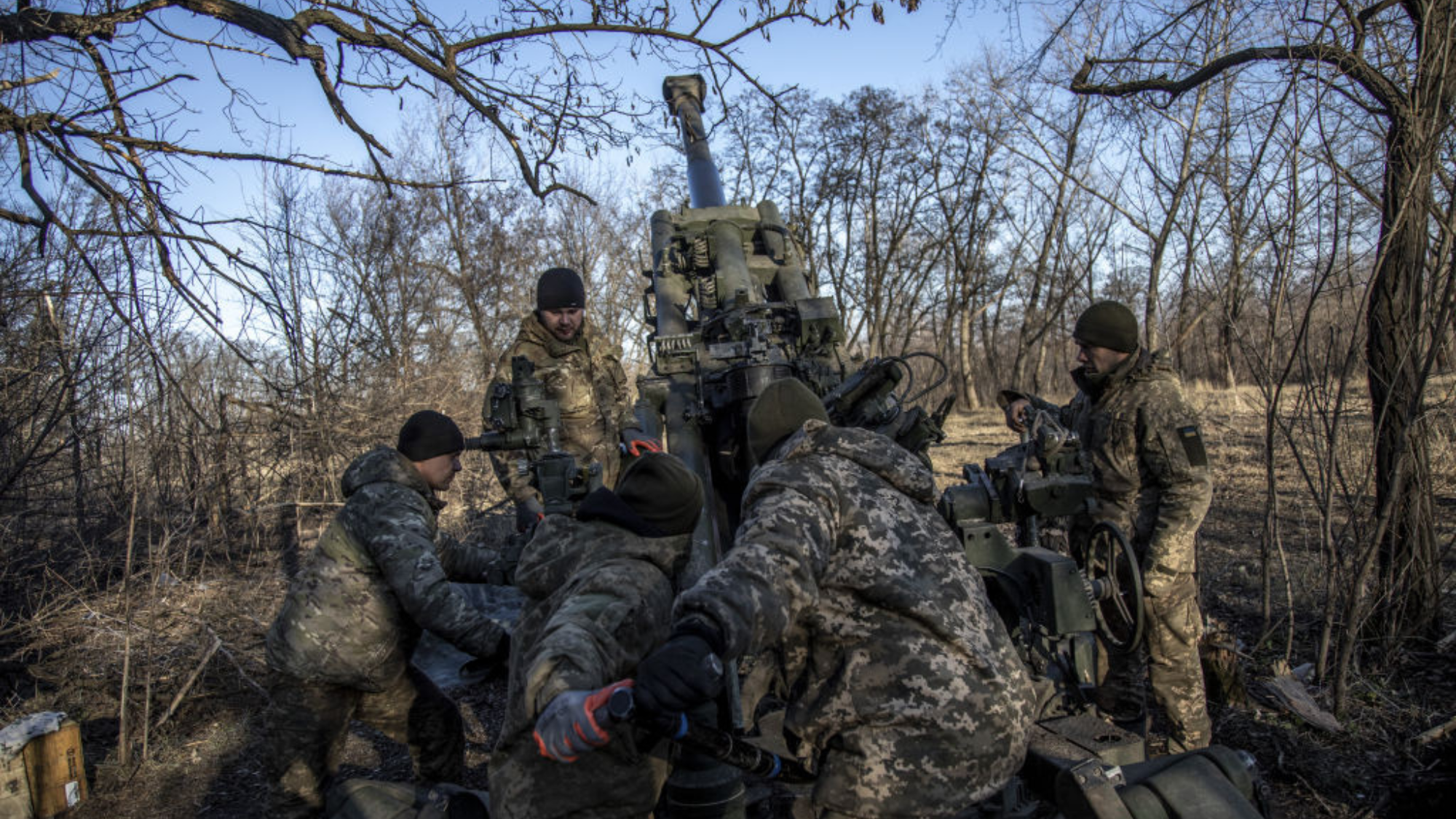Aid to Ukraine: too little, too late?
House of Representatives finally 'met the moment' but some say it came too late

A free daily email with the biggest news stories of the day – and the best features from TheWeek.com
You are now subscribed
Your newsletter sign-up was successful
"Just one week ago, hope looked fanciful," said The Economist. Since October last year, President Biden's proposal to spend $61 billion on aid for Ukraine (and smaller amounts for Israel and Taiwan) had "languished in congress".
The military consequences for Ukraine, which is facing desperate shortages of artillery ammunition and air defence missiles, were dire. The CIA director William Burns warned last month of "a very real risk that the Ukrainians could lose on the battlefield by the end of 2024".
But opposition to further US support from the isolationist wing of the Republican Party seemed insuperable. The new Republican speaker of the House of Representatives, Mike Johnson, is himself a sceptic on Ukraine, and colleagues on the right of his party had threatened to unseat him if he tabled the bill.
The Week
Escape your echo chamber. Get the facts behind the news, plus analysis from multiple perspectives.

Sign up for The Week's Free Newsletters
From our morning news briefing to a weekly Good News Newsletter, get the best of The Week delivered directly to your inbox.
From our morning news briefing to a weekly Good News Newsletter, get the best of The Week delivered directly to your inbox.
Yet last Saturday, under Johnson's leadership, the House "met the moment", passing the bill through extraordinary parliamentary manoeuvring: a majority of his own party voted against additional aid, but the Democrats were unanimous in support. As a result, $61 billion of aid is on the way to Ukraine. "It should have an almost instant effect."
'Severe setback' for Russia
Pentagon officials have indicated that US artillery shells stockpiled in Europe could be shipped to Ukraine within weeks, said Diane Francis in The Kyiv Post.
With US missile systems likely to arrive before the expected Russian offensive in early summer, Ukraine's eastern front should soon be stabilised. And Europe's governments and military industries are now finally mobilising in support; F-16 jets are expected in June.
Russia's campaign has suffered a severe setback, said Anne Applebaum in The Atlantic. This aid package alone won't turn the tide. But "suddenly the Russian military and Russian society are once again faced with the prospect of a very long war".
A free daily email with the biggest news stories of the day – and the best features from TheWeek.com
A cloudy outlook
For many ordinary Ukrainians, "the aid is too little, too late", said Owen Matthews in The Spectator. In the past few months, they have lost lives, land and infrastructure because of Western dithering. They know "that their security is dependent on the political whims of their allies and could once again evaporate": Donald Trump could be elected in November, and has claimed that he would end the war in "one day".
The vote was "historic", said The Washington Post. But it was more "an inflection point than a conclusion". The rise of a "selfish, simplistic America First ideology" in the Republican Party puts Europe's security "at risk".
US support for Ukraine is guaranteed for the next few months."Beyond that, the outlook is cloudier."
-
 What are the best investments for beginners?
What are the best investments for beginners?The Explainer Stocks and ETFs and bonds, oh my
-
 What to know before filing your own taxes for the first time
What to know before filing your own taxes for the first timethe explainer Tackle this financial milestone with confidence
-
 The biggest box office flops of the 21st century
The biggest box office flops of the 21st centuryin depth Unnecessary remakes and turgid, expensive CGI-fests highlight this list of these most notorious box-office losers
-
 What is ‘Arctic Sentry’ and will it deter Russia and China?
What is ‘Arctic Sentry’ and will it deter Russia and China?Today’s Big Question Nato considers joint operation and intelligence sharing in Arctic region, in face of Trump’s threats to seize Greenland for ‘protection’
-
 What would a UK deployment to Ukraine look like?
What would a UK deployment to Ukraine look like?Today's Big Question Security agreement commits British and French forces in event of ceasefire
-
 Would Europe defend Greenland from US aggression?
Would Europe defend Greenland from US aggression?Today’s Big Question ‘Mildness’ of EU pushback against Trump provocation ‘illustrates the bind Europe finds itself in’
-
 Did Trump just end the US-Europe alliance?
Did Trump just end the US-Europe alliance?Today's Big Question New US national security policy drops ‘grenade’ on Europe and should serve as ‘the mother of all wake-up calls’
-
 Taiwan eyes Iron Dome-like defence against China
Taiwan eyes Iron Dome-like defence against ChinaUnder the Radar President announces historic increase in defence spending as Chinese aggression towards autonomous island escalates
-
 Is conscription the answer to Europe’s security woes?
Is conscription the answer to Europe’s security woes?Today's Big Question How best to boost troop numbers to deal with Russian threat is ‘prompting fierce and soul-searching debates’
-
 Trump peace deal: an offer Zelenskyy can’t refuse?
Trump peace deal: an offer Zelenskyy can’t refuse?Today’s Big Question ‘Unpalatable’ US plan may strengthen embattled Ukrainian president at home
-
 Vladimir Putin’s ‘nuclear tsunami’ missile
Vladimir Putin’s ‘nuclear tsunami’ missileThe Explainer Russian president has boasted that there is no way to intercept the new weapon